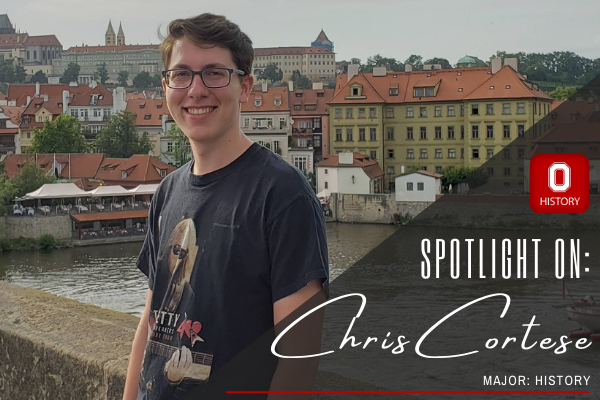Spotlight on Chris Cortese

Chris Cortese is a history major from Oakton, Virginia.
What do you love most about history?
I am fascinated by the lived experiences of those who came before us. History allows us to explore with scholarly rigor the contexts and contingencies surrounding historical events and actors, and with a bit of imagination one can place themselves into the past, albeit imperfectly. It is this sense of connection with those who came before us and shaped the world we live in today that inflames my interest in history, along with a desire to share this connection with others.
Why did you choose to be a history major?
I started reading James Michener’s historical fiction my junior of high school, starting with his novel Poland. The richness and thoroughness of his grand historical narrative awakened the idea of historical connectedness within me and made me more curious about the past. I entered Ohio State as a declared Astronomy & Astrophysics major and quickly realized it was not for me. I switched my major to History and never looked back from the humanities, adding a second major in International Studies as a sophomore and entering the combined B.A./M.A. program in Public History as a senior.
What are the favorite history courses you have taken?
It’s a tough choice, but here are my top three. History 3375 – "Mongol World Empire: Central Eurasia, 1000-1500”, with Dr. Scott Levi; History 4285 – “Seminar on the Russian Revolution and Stalinism”, with Dr. David Hoffman; and History 3250 – “Revolutionary and Napoleonic Europe”, with Dr. Elizabeth Bond.
Do you have a favorite professor or professors? Who are they and why?
Another tough question! My top two would have to be Dr. David Staley and Dr. Elizabeth Bond. Dr. Staley’s imaginative and critical approaches to studying the past and future have inspired me to widen my horizons more than anyone else in the department. Through his instruction I have learned to think beyond the traditional, textual approach to doing history. With Dr. Bond I was exposed to both grand histories on the scale of continents and empires, and more intimate, personal histories that illustrate the role of the individual in experiencing the past. She taught me more than any other professor how these two kinds of histories can intersect and generate more advanced understandings of the past.
What’s one thing you wish every Buckeye knew about the past (and/or about the history department)?
I wish more people understood the role of organized labor unions in the construction of America as we know it today, especially the incredible struggle and violence, from industry and the state, that laborers (organized and unorganized) endured in the 19th and 20th centuries to win labor rights that many take for granted today.
